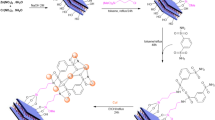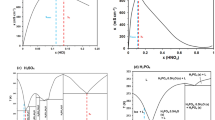Abstract
A RECENT study1 of the formation of a variety of inclusion compounds by potassium benzene sulphonate led to the conclusion that it could form zeolitic structures in the interstices of which various species could be intercalated. Such structures would give Langmuir-type intercalation isotherms2,3, but the whole isotherm course would not necessarily be realizable because, when the content of included molecules fell below a certain limit, the zeolitic structure may become metastable and collapse into a sorbate-free but more compact crystal lattice of potassium benzene sulphonate.
This is a preview of subscription content, access via your institution
Access options
Subscribe to this journal
Receive 51 print issues and online access
$199.00 per year
only $3.90 per issue
Buy this article
- Purchase on Springer Link
- Instant access to full article PDF
Prices may be subject to local taxes which are calculated during checkout
Similar content being viewed by others
References
Barrer, R. M., Drake, J., and Whittam, T. V., Proc. Roy. Soc., A 219, 32 (1953).
Barrer, R. M., Ann. Rep. Chem. Soc., 41, 31 (1945).
van der Waals, J. H., Farad. Soc. Discuss. No. 15, 261 (1953).
Author information
Authors and Affiliations
Rights and permissions
About this article
Cite this article
BARRER, R. Stoichiometry of Inclusion Compounds. Nature 176, 745–746 (1955). https://doi.org/10.1038/176745a0
Issue Date:
DOI: https://doi.org/10.1038/176745a0
Comments
By submitting a comment you agree to abide by our Terms and Community Guidelines. If you find something abusive or that does not comply with our terms or guidelines please flag it as inappropriate.



